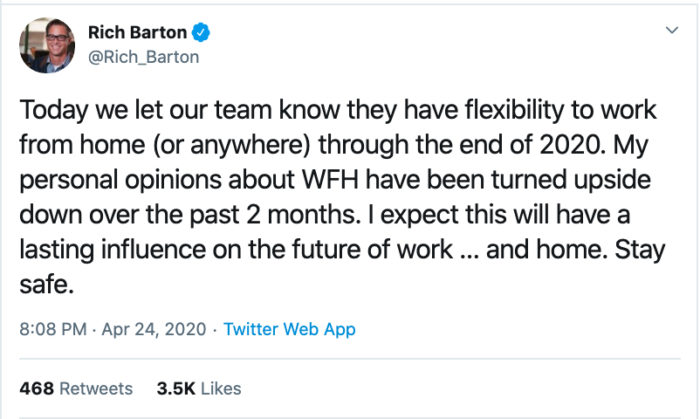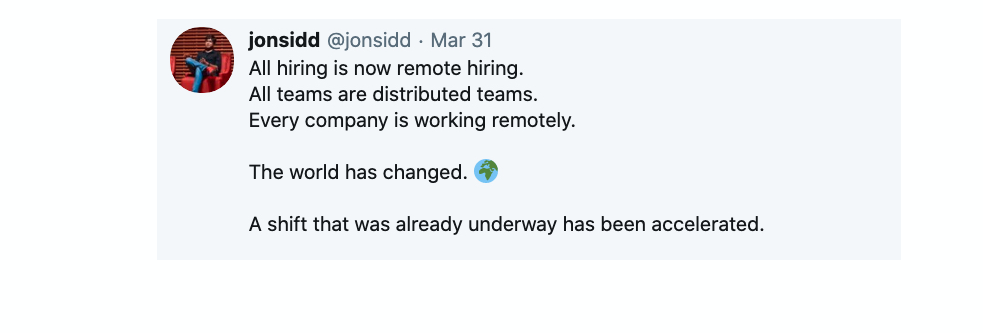Will Remote Work Continue Post COVID-19?
The world has changed. In December of 2019, you wouldn’t have been willing to bet that by April of 2020, we’d be doing every technical job in the US from our homes.
Yet here we are as the world’s biggest-ever experiment in remote work enters its second full month. Perhaps the biggest surprise of all is that for most companies, even those with little or no remote work experience, things have been going pretty well.
So well, that Benedict Evans, the author of this remarkable newsletter (If you haven’t signed up, you should.) felt that now was an opportune time to reprise a wry truism and ask some excellent questions about it.

But then, he goes on to say:
“And in parallel, for years people wondered if the exploding cost of living and declining quality of life in Silicon Valley would force companies to start moving out . When would ‘are you driven enough to live here?’ be overtaken by ‘I can’t live here no matter what’?
“And now, we’ll find out. How many Silicon Valley companies will come out of months of forced remote work and decide that actually, they don’t need to pay SV office rents, and they don’t need to pay salaries to support housing costs 50% higher than London or NYC?
“So, this could be a catalyst for an acceleration in the global diffusion of software companies. /fin”
Or to put it more simply, as a result of coronavirus, has “remote work” become merely “work”? A lot of smart people seem to think so.
Below, Rich Barton, the co-founder of Zillow, announcing via Twitter that his entire team will be able to keep working from home for many months. He’s one among many Silicon Valley leaders that have come to agree that the benefits of remote work often exceed the drawbacks, even when you take the current pandemic out of the equation.
 .
.
Meanwhile, Jason Aten writes that even the behemoth, Microsoft, believes that remote work isn’t going to disappear once we emerge from the current situation.
Investors, many that used to believe that every key person needed to work from the same location, have altered their beliefs in today’s new reality.
This tweet from investor Jeff Morris is a great example:

As I type this, a number of companies are collecting data to learn just how far along the curve we are from remote work as a novelty to remote work becoming the way most of us work going forward.
We’re trying to find out how productivity has changed with most employees working remotely. We want to know whether people feel that remote work has improved or reduced their quality of life. We hope to get an idea of the annual savings companies expect to realize by eliminating the cost of maintaining some of the most expensive office space on earth, and we’ve been monitoring the shift in total payroll expense as a result of companies leveraging remote talent in geo-arbitrage regions.
While we don’t have answers yet, we have some clear sentiment. Many people won’t go back to the office. Some will appreciate the option to work where they please. CEOs believe they can radically reduce real-estate and salary costs without sacrificing much, if anything, in the performance of their teams.
At Turing, March was the company’s biggest month ever. Demand for skilled, remote-ready engineers has never been higher. And all of a sudden, companies that were remote-reticent have become believers.
While many uncertainties are staring us in the face, one thing is relatively sure; right now is not a great time to be a commercial realtor in Silicon Valley.
Tell us the skills you need and we'll find the best developer for you in days, not weeks.











